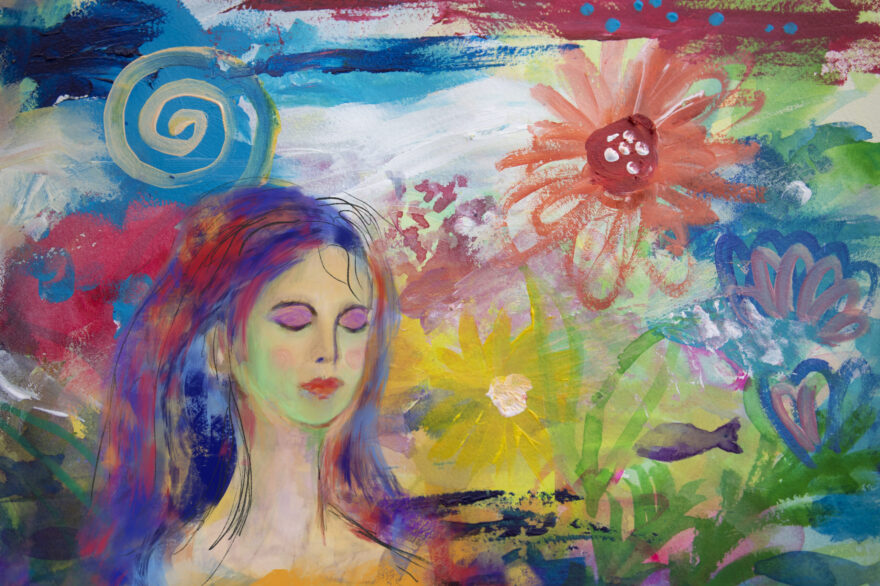One Last trip: Psychedelics and Dreams at End of Life
Online

An online lunchtime discussion that delved into the use of psychedelics and dreams to ease the end-of-life experience.
The ritual use of psychedelics to heal and ease suffering is an ancient practice, and today it’s a re-emerging field of study, this time for their effectiveness in hospice and palliative care.
“One Last Trip: Psychedelics and Dreams at End of Life,” an online panel co-presented by Hollywood, Health & Society and End Well, delved into to the topic of using psychoactive medicine such as psilocybin in a guided, comfortable setting to relieve anxiety and depression in those with terminal illnesses.
Equally important, it was an opportunity to explore how to expand the end-of-life narrative in TV entertainment, with its often overly fraught depiction of dying.
Featured guest speakers for the May 15 webinar were Michael Pollan, journalist and the author of eight books including How to Change Your Mind; DJ Nash, creator and executive producer of A Million Little Things, which ran for five seasons on ABC; Dr. B.J. Miller, a palliative care physician; and moderator Dr. Shoshana Ungerleider, founder of End Well, a nonprofit focused on making the end of life a part of life.
“Far too many people receive care at the end of the life that they don’t want and doesn’t honor the life they lives,” Ungerleider said. “They experience existential distress as they approach the end of life, but [the use of psychedelics] improves their acceptance of death.
“Psychedelic-assisted therapy research is finally getting the attention it deserves after being sidelined for over 40 year,” she said.
But how does it work?
Pollan, whose bestseller How to Change Your Mind explored the history and use of psychedelics (he executive produced a 2022 Netflix documentary based on his book), pointed to a neuroscientific explanation where “people often go through a mystical experience, an ego dissolution that marks the death of the self.”
In a 2015 article for The New Yorker magazine titled “The Trip Treatment,” Pollan reported on cancer patients who participated in clinical trials studying the use of psychedelics. He quoted one of the researchers who said that under the influence of hallucinogens, patients “transcend their primary identification with their bodies and experience ego-free states … and return with a new perspective and profound acceptance” of their situation.
Pollan writes:
Every guided psychedelic journey is different, but a few themes seem to recur. Several of the cancer patients I interviewed at N.Y.U. and Hopkins described an experience of either giving birth or being born. Many also described an encounter with their cancer that had the effect of diminishing its power over them.
Yet Pollan cautioned that some people don’t have good experiences with psychedelics. In The New Yorker article he mentions that hallucinogens can “sometimes bring to the surface latent psychological problems, [and so] researchers try to weed out volunteers at high risk by asking questions about drug use and whether there is a family history of schizophrenia or bipolar disorder.”
He added that sometimes family members are against the use of psychedelics because they see it as a rejection of Western medicine, of abandoning the fight against their illness.
“We’re very invested in this fight against cancer, against death,” he said.
During the panel discussion, Pollan said people have a lot to process and work on following the sessions with hallucinogens.
“They may need help finding the narrative about their psychedelic experience,” he said.
Miller pointed out that the use of hallucinogens is not a case of numbing someone to the death experience. “Rather, it’s offering them a portal,” he said.
Nash’s show A Million Little Things explored complex narratives among a group of close friends, and the show begins with a suicide of one character and ends with an assisted suicide of another character, Gary, who has lung cancer.
Nash said he took inspiration for the show’s storyline from the real-life suicide of a close friend.
The death of his father, Mel, in 2020 made Nash accept that perhaps there are things in life and death that lie in a more mystical realm.
“Since my dad’s gone, I’ve had these dreams so vivid that involve him and this portal where someone you know who has died can come back,” he said. “My relationship with my dad isn’t over, it’s just changed.”
